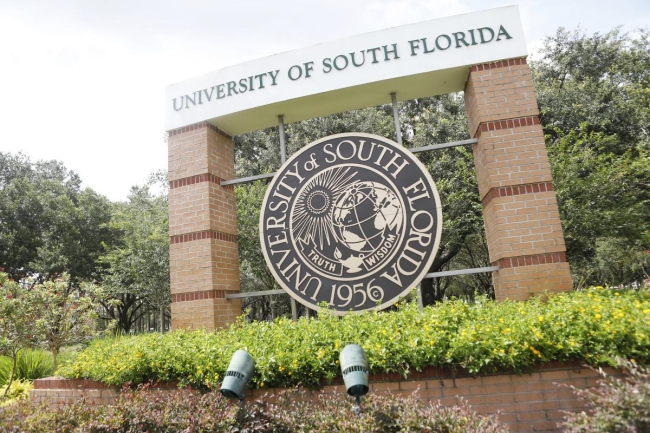You have /5 articles left.
Sign up for a free account or log in.

The Florida Supreme Court agreed to hear the University of South Florida’s petition to dismiss its students’ lawsuit over campus closures during the pandemic.
Octavio Jones/Getty Images
The Florida state Supreme Court announced Tuesday that it would hear a lawsuit against the University of South Florida over campus shutdowns and remote learning during the COVID-19 pandemic.
The higher court could overturn an earlier decision by a circuit court in June that denied USF’s motion for dismissal and paved the way for an eventual jury trial. Lawyers for the university filed a petition for the appeal last week.
Doctoral student ValerieMarie Moore initially filed a class action lawsuit against USF last March on behalf of herself and her peers. It alleges that the university was in breach of contract when it switched to remote learning in 2020 and again in spring 2021 and failed to provide services paid for by student fees.
“USF’s decision to transition to online classes, request or encourage students to leave campus, and shut down its campus facilities and services were responsible decisions to make, but it is unfair and unlawful for USF to retain the fees and pass the losses on to the students and their families,” the lawsuit claims.
In May 2020, USF said it had issued over $12 million in refunds to students for housing and dining fees.
Althea Johnson, USF’s director of media relations, told Inside Higher Ed that the university does not comment on pending litigation; the university’s lawyers also declined to comment. A lawyer for the student plaintiffs did not respond to a request for comment.
When the first campus closure lawsuits rolled in last year, courts seemed skeptical of the plaintiffs’ legal arguments, dismissing dozens of initial cases. But since then, many others have been allowed to go to trial despite universities’ repeated attempts to block them. Some cases that were initially dismissed, such as those against American University, George Washington University and Baylor University, were revived by appeals courts earlier this year.
Same Goal, New Tactic
Universities that have asked courts to dismiss breach-of-contract suits often cite the “educational malpractice doctrine,” a legal argument that posits that educational institutions can’t be sued over the quality of the education they offer because “quality” is subjective and difficult to prove.
Many judges have denied these petitions, since the students’ cases rest not on the quality of their education but on specific promises—namely, in-person classes and on-campus residency—that were not provided due to the pandemic.
“Almost all of [the institutions] lost that argument because the court said [students] are not arguing about the value of their education,” said Audrey Anderson, counsel at Bass, Berry and Sims and former vice chancellor and general counsel at Vanderbilt University. “What they’re saying is, ‘You promised us certain things in a contract and one of those things was in-person education, and we didn’t get it.’”
USF’s case for dismissal, however, does not rely on an educational malpractice argument. Instead, it rests on a broad interpretation of the 11th Amendment to the U.S. Constitution, also known as sovereign immunity. It’s an argument that only applies to public, state-run institutions. Another Florida campus-closure case, Verdini v. Miami Dade College, was dismissed by a different appeals court in April based on a similar sovereign immunity argument.
Anderson said this is likely what made the USF case attractive to the Florida Supreme Court.
“The state Supreme Court is not going to be quite as interested in the factual determination of the University of Southern Florida’s contractual obligations. That’s not the kind of question they’d want to spend their time on,” she said. “But a question like what actions are state universities immune from? That’s something that really warrants their attention.”
USF’s lawyers claim that as a public institution and thus an extension of the State of Florida, the university cannot be sued by any citizen without the state’s consent. Their appeal to the state Supreme Court holds that the circuit court was wrong to reject their motion to dismiss in June because the student plaintiffs should have to provide written evidence of the contractual terms they claim were violated.
“Waiver of sovereign immunity for contract claims is limited to suits on express, written contracts,” USF’s lawyers wrote in their petition.
The appellate circuit court, on the other hand, had pointed to USF’s class registration agreement—which reads “by clicking ‘Submit Changes’ below, I am entering a legal, binding contract with USF”—as a potential written contract with students, though it does not enumerate specific services promised.
A Legal Lifeboat on the Line
USF isn’t the only institution attempting to use sovereign immunity to block students’ campus-closure lawsuits. The University of North Carolina system appealed to its own state supreme court last month to overturn a lower court’s decision denying its motion to dismiss, which was also based on a sovereign immunity argument.
“This decision is not only inconsistent with North Carolina law and pleading standards, it also disregards the fundamental relationship between [UNC] and its students … and erodes the doctrine of sovereign immunity in a way that would invite a massive influx of litigation against the State and its agencies,” the UNC system’s petition claims.
Joshua Ellis, the UNC system’s associate vice president for media relations, told Inside Higher Ed that the system does not comment on pending litigation.
Even if USF’s argument succeeds before the state Supreme Court, it wouldn’t necessarily apply to public institutions in other states.
“It really varies from state to state as to what the state has declared itself to be immune from,” Anderson said. “They could win in Florida and have the same facts in North Carolina and lose there, because North Carolina law is different.”
Many private universities facing similar breach-of-contract lawsuits have settled for $1 million, including Ivy League institutions with deep pockets like Brown University and Columbia University, and smaller institutions such as Lindenwood University in Missouri. But Anderson said that with the strength of their sovereign immunity claims at stake, it makes sense that USF and other public institutions would want to litigate rather than settle—even if their legal fees exceed any potential settlement sum.
“Public universities really want to strengthen sovereign immunity, so having an opportunity to clarify the law about the contours of that principle is the kind of case where an institution could reasonably say, ‘Let’s not settle, let’s move ahead with this,’” Anderson said. “The savings will be so much more if they can make it clear that students just can’t be suing over this kind of stuff.”
At the same time, she added, there’s a danger that USF’s gambit backfires. If the state Supreme Court upholds the circuit court’s denial, not only will the university remain subject to the lawsuit but the sovereign immunity principle might be weakened.
“There is a danger that you’ll get a bad decision, which will narrow things more than [institutions] want them narrowed,” Anderson said. “There’s always risk and reward to weigh against one another in litigation.”









